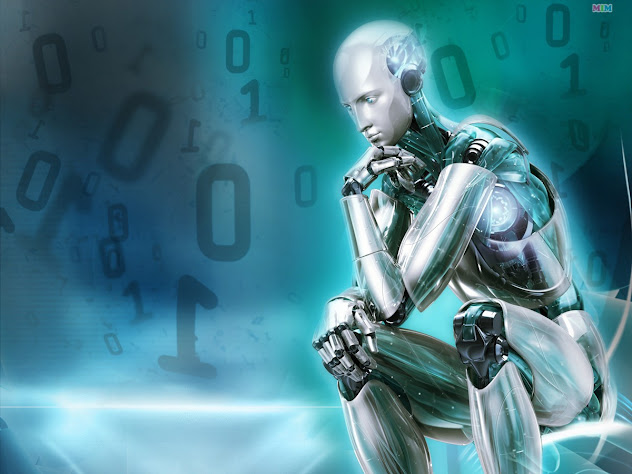''' '' BOTS -!WOW!-
BOND '' '''
SHALL I COMPARE THEE TO A CHATBOT'S ALGORITHM? THE NEW wave of machines are so convincing - we need new ways of judging them.
For more than 70 years, computer scientists have struggled to build technology that could pass the Turing test : the technological inflection point where we humans are no longer sure whether we are chatting with a machine or a person.
The test is named for Alan Turing, the British mathematician, philosopher and wartime code breaker who proposed the test back in 1950. He believed that it could show the world when machines had finally reached true intelligence.
The Turing test is a subjective measure. It depends on whether the people asking the questions feel convinced that they are talking to another person when in fact they are talking to a device.
BUT whoever is asking the questions,machines will soon leave this test in the rear view mirror.
Bots like Franz Broseph have already passed the test in particular situations, like negotiating Diplomacy moves or calling a restaurant for dinner reservations. ChatGPT, a bot released in November, by OpenAI, a San Francisco lab, leaves people feeling as if they were chatting with another person, not a bot.
The lab said more than a million people had used it. Because ChatGPT can write just about anything, including term papers, universities are worried that it will make a mockery of classwork.
When some people talk to these bots, they even describe them as sentient or conscious, believing that machines have somehow developed an awareness of the world around them.
Privately, OpenAI has built a system, GPT-4, that is even more powerful than ChatGPT. It may even generate images as well as words.
And yet these bots are not sentient. They are not conscious. They are not intelligent. Even people building the technology acknowledge this point :
''These systems can do a lot of useful things,'' said IIlya Sutskever, chief scientist at OpenAI and one of the most important A.I.researchers of the past decade, referring to the new wave of chatbots.
''On the other hand, they are not there yet. People think they can do things they cannot.''
Franz Broseph seemed like any other Diplomacy player to Claes de Graaff. The handle was a joke -Austrian Emperor Franz Joseph I reborn as an online bro- but that was the kind of humour that people who play Diplomacy tend to enjoy.
The game is a classic, beloved by the likes of John F. Kennefy and Henry Kissinger, combining military strategy with political intrigue as it recreates World War 1 : Players negotiate with allies, enemies and those in between as they plan how their armies will move across 20th-century Europe.
WHEN Franz Broseph joined a 20 player online tournament at the end of August, he wooed other players, lying to them and ultimately betraying them.He finished in first place.
Mr. de Graaff, a chemist living in the Netherlands, finished fifth. He had spent nearly 10 years playing Diplomacy, both online and at a face-to-face tournament across the globe.
He did not realize until it was revealed several weeks later that he had lost to a machine. Franz Broseph was a bot.
'' I was flabbergasted,'' Mr. de Graaff, 36, said. ''It seemed so genuine - so life- like.It could read my texts and converse with me and make plans that were mutually beneficial - that would allow both of us to get ahead. It also lied to me and betrayed me, like top players frequently do.''
Built by a team of artificial intelligence researchers from the tech giant Meta, The Massachusetts Institute of Technology and other prominent universities, Franz Brospeh is among the new wave of online chatbots that are rapidly moving machines into new territory.
When you chat with these bots, it can feel like chatting with another person. It can feel, in other words, as if machines have passed a test that was supposed to prove their intelligence.
As the latest technologies emerge from research labs, it is now obvious that scientists must rethink and reshape how they track the progress of artificial intelligence. The Turing test is not up to the task.
Time and time again, A.I. technologies have surpassed supposedly insurmountable tests, including mastery of chass [1997], ''Jeopardy!'' [2011], Go [2016] and poker [2019]. Now it is surpassing another, and again this does not necessarily mean what we thought it would.
WE - the public - need a new framework, for understanding what A.I. can do, what it cannot, what it will do in the future and how it will change our lives, for better or for worse.
The Honour and Serving of the Latest Global Operational Research on Robots, Bots, Future and Smartness, continues. The World Students Society thanks author Cade Metz.
With most respectful dedication to the Research Scientists, Mankind, and then Global Founder Framers of The World Students Society -the exclusive ownership of every student in the world : wssciw.bogspot.com and Twitter -!E-WOW! - The Ecosystem 2011 :
Good Night and God Bless
SAM Daily Times - the Voice of the Voiceless

.png)


0 comments:
Post a Comment
Grace A Comment!